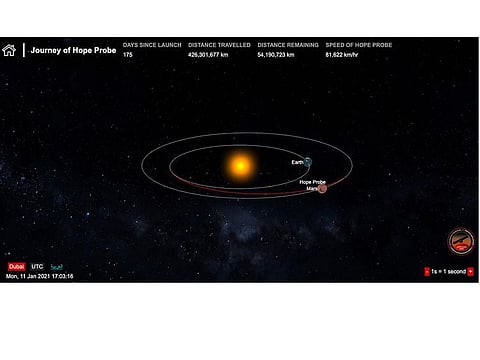UAE’s Hope Probe set to reach Mars first before China and US
UAE’s Hope Probe set to reach the Red Planet on February 9 at 7.42pm

Dubai: The UAE’s Hope Probe (Al Amal in Arabic) is set to reach Mars first among the three space missions expected to reach the Red Planet next month.
Cruising at a speed of 81,627km/hr with a distance of around 54.2 million km remaining as of Monday (January 11), the first Arab interplanetary mission to Mars, is expected to reach the Red Planet’s orbit on February 9 at 7.42pm (UAE time).
The UAE’s Hope Probe will be the first to reach the Red Planet, followed by China’s Tianwen-1 dual orbiter-rover on February 10, while NASA’s Perseverance rover will make a landing attempt in an area on Mars on February 18.
All three Mars missions were launched in July last year and Hope Probe has so far travelled over 426 million kms after lift off from Japan’s Tanegashima Space Centre at 1.58am (UAE time) on July 20.

Mars data for free sharing
Hope Probe will orbit the Red Planet for one Martian year, roughly equivalent to two Earth years, to provide the first-ever complete picture of Mars atmosphere. It is expected to collect more than 1,000GB of new data, which will be shared with more than 200 academic and scientific institutions around the world for free. By studying the connection between current Martian weather and the ancient climate of the Red Planet, scientists will have deeper insights into the past and future of the Earth as well as the potential for human settlement on Mars and other planetary objects.
China’s Tianwen-1 spacecraft, meanwhile, will first orbit Mars before sending a lander containing a rover on its surface in May. If it succeeds, China will become the third country to land a rover on Mars.
The US Perseverance rover, nicknamed Percy, will become the 11th Mars probe sent by Nasa. The six-wheel rover, accompanied by a small camera-equipped helicopter called Ingenuity, is aiming for Jezero crater, a spot that scientists believe was once a lake. Perseverance rover will perform the most extensive search for past life on Mars to date.
Mars orbit insertion

After entering Mars’ orbit, Hope Probe will then transition to Science phase. This is when it will commence with its mission to build the first complete structure of the Martian atmosphere using its three advanced scientific instruments that will take pictures of the Red Planet’s atmosphere for one Martian year or around two Earth years.
From the UAE to Mars and beyond
Hope Probe is the realisation of UAE’s ambitious space programme, which according to Mohammed Al Ahbabi, director general of the UAE Space Agency, dates back to the 1970s, when the late Sheikh Zayed bin Sultan Al Nahyan, the UAE’s founding father, met with the Nasa team responsible for the Apollo moon landing. Today, the UAE has a flourishing space sector with 12 satellites in orbit and six others being developed.
His Highness Sheikh Mohammed bin Rashid Al Maktoum, Vice-President and Prime Minister of the UAE and Ruler of Dubai, announced in September last year an Emirati-made rover that would land on the surface of the moon by 2024. The rover was named “Rashid”, after the late Sheikh Rashid bin Saeed Al Maktoum, the builder of modern Dubai and one of the UAE’s Founding Fathers.
Going to the Moon in 2024 will pave the way to accomplish the UAE’s mission of sending humans to Mars by 2117, according to Adnan AlRais. Rashid will explore the Moon’s surface that has not been studied by previous lunar missions and will boost the UAE’s capacity in space missions.








